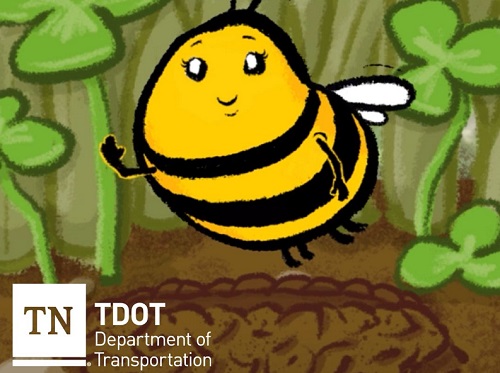The Tennessee Department of Transportation is helping create habitats for the Monarch Butterfly and other pollinators through the U.S. postal service; mailing packs of milkweed seeds to any state resident who wants to plant the flower that serves as the iconic orange and black insect’s exclusive egg-laying crib.
[Above photo by the Tennessee DOT]
Milkweed naturally grows around the country, but extreme heat and drought have reduced the number of milkweed plants in North America. Fewer milkweed plants mean fewer Monarchs, and fewer Monarchs mean less pollination for all plant life.
Tennessee DOT started Project Milkweed in 2023, “and we had a good response,” said Michael McClanahan, the agency’s transportation manager in the highway beautification office. As the word spread that Tennessee DOT would send free seeds to people to plant in their gardens, the demand for the tiny seeds ramped up, “and it wound up going viral.”
After replenishing their supply of seeds a few times because of overwhelming demand, the agency finally ran out of seeds and had to stop taking orders. Final total: 780,000 packs of milkweed seeds mailed out across Tennessee in 2023.
At 20 seeds per pack, that’s more than 15 million seeds Tennessee DOT spread to all corners of the Volunteer State.
“We knew we had lightning in a bottle,” McClanahan said, with department staffers so busy keeping up with the demand that, “honestly, we’re struggling to do some after-action reporting on it.”
Tennessee DOT restarted the program this June to coincide with National Pollinator Week. Tennessee residents can request one pack of either red milkweed seeds for small gardens or common milkweed seeds for larger areas.
Milkweed is ideally planted in early fall, with the plant usually flowering in July; meaning those sent out 2023 seeds are set to bloom in this year, in 2024. Although the Monarch Butterfly will feed from – and pollinate – a variety of plants that have nectar, the insects seek out milkweed to lay their eggs because the caterpillar that emerges from its egg can only feed on milkweed leaves.
That species of butterfly is also an impressive migrator and it makes an annual winter trek to the mountains of central Mexico in a trip that takes up to four generations of butterflies to complete.
Because of their short life spans, Monarchs will stop along the way, lay eggs, and die, passing a DNA roadmap to their offspring, who will take the baton and continue the trip that their great-grandmothers started.
Entomologists have been sounding the alarm for years that the winter gathering of Monarchs in Mexico are getting smaller. A World Wildlife Fund report estimated the number of Monarchs making the trip in 2023-2024 may have been 59 percent lower than the previous winter.
“They are critically threatened,” Tennessee DOT’s McClanahan said. “This program is something we were able to do that was a little more targeted to what the Monarchs need.”
The agency has been recognized in the past for its efforts to aid pollination. In January, the department received the 2023 Pollinator Roadside Management award from the North American Pollinator Partnership Campaign for its roadside practices.
McClanahan noted that his office usually handles “litter pickup and landscaping, and scenic roads, but this is easily one of the most popular offerings we’ve undertaken. We think it may be one of the largest seeds offerings in the country. It’s just been surprising to us how widespread the interest was among people to do the right things in their gardens.”

